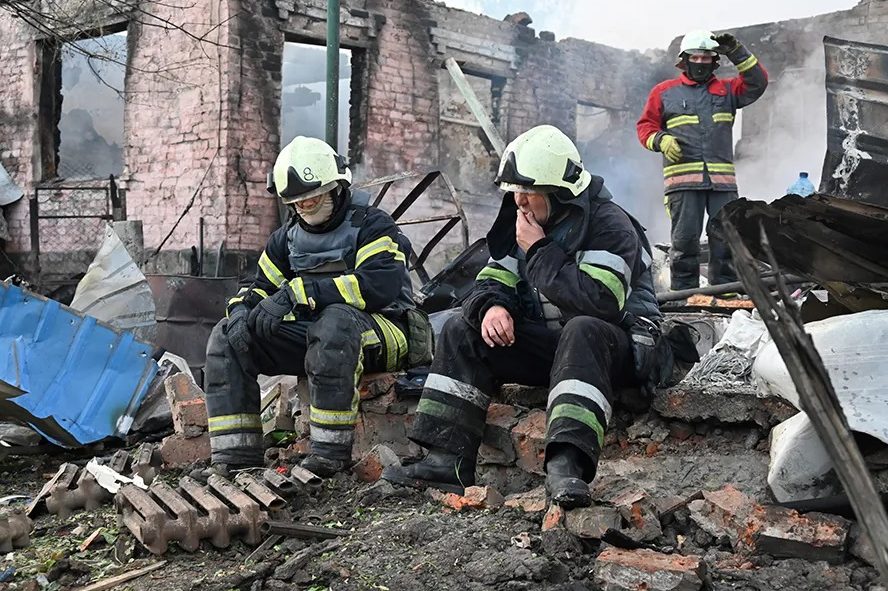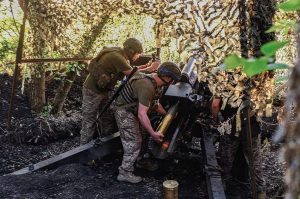It was a strange feeling to walk alone through eerie corridors in the basement of the Kharkiv Opera Theater and suddenly hear a burst of music and applause. As Kharkiv faced the Russian advance, a Kyiv-based drama group had come to the city to hold an Art Fortress concert to raise the spirits of local residents. For the audience, mainly middle-aged women, this underground event was a welcome distraction from the encroaching reality. Many waved in time to the music, delighted by the performance, and chanted “Slava Ukraini” as the closing remarks were made.
As another missile is heard, first responders in helmets and body armor rush down to the metro
This support is vital as the city braces for what lies ahead. The latest Russian advance has brought them within twelve miles of Ukraine’s second-largest city. The relentless bombardment suggests a deliberate strategy to render Kharkiv uninhabitable. As explosions roar through the city center in the afternoons, the residents wait them out in the metro, glued to their phones, seeking information about new launches and the aftermath of attacks. Emerging from Naukova metro station, next to a McDonald’s that has been closed since the invasion began and a large shopping center, people hesitate at the exit, peering out to check it’s safe.
The caution is justified. As another missile is heard in the distance, first responders wearing helmets and body armor rush down into the metro — a necessary precaution after a series of Russian double-tap attacks. They run over shattered glass — the doors were blown out by the shock wave from a bomb that struck a nearby residential high-rise.
I meet one resident who is sheltering underground with her three children. The family spent the first three months of the war living in the metro, and the mother is scared about what is going to happen next, but she doesn’t have the money for them to leave the city, nor a place to go. As we speak, Polina, seven, keeps asking if they can go; Nikita, ten, who has autism, cannot stand staying in one place for too long. After a short time, they venture back out on to the street.
While some residents stay because they have no option, Oleksandr Popovych, the director of Unisoft, Ukraine’s largest book factory, stays because to leave behind more than 360 workers would feel like a betrayal. Originally from Kyiv, Oleksandr has called Kharkiv his home since the full-scale invasion. He’s proud of his business. He walks amid the hum of high-tech printers, gently touching stacks of freshly printed books, and chatting amiably with his employees. Despite the war, the company has thrived; several new machines have been acquired and the technicians are learning to maintain them, since foreign engineers will not risk coming to the city. Preparations are under way for whatever awaits: three months’ worth of printing paper has been stockpiled; workers are beginning to assemble the new equipment bought from Switzerland.
The challenge is how to keep the factory’s staff safe as Russia’s attacks intensify. People are nervous, but only a few have decided to leave. The work is both mission and solace. Some, like Andriy, have been employed here for more than fifteen years and returned to work immediately after the Russians were repelled from Kharkiv in the early months of the invasion. Since then, a bomb shelter has been built on the premises, which can be reached in ninety seconds if an attack is imminent.
Half an hour’s drive away is an evacuation meeting point, bustling with groups of tired, distressed people surrounded by their bags and boxes of necessities and pet dogs. There are several neighboring families from Vovchansk. One woman shows her flip-flops — the only shoes she managed to grab during the evacuation. Her neighbor is crying because her dog couldn’t fit in the car.
On arrival, people register and move from tent to tent, being given food, water and hygiene packages, and wait for cars to take them to temporary shelters. They don’t know how long they will be away from their homes or what they’ll find on their return. Most endured Russian occupation in 2022 and are determined not to experience it again. Kharkiv, despite the regular Russian air attacks, has become a safe haven for these people.
Having endured being evacuated during shelling, ninety-two-year-old Svitlana Semenivna manages a smile. Her hometown, Vovchansk, was engulfed in flames. As emergency workers carefully guide her into a car she talks about her experience of the German Nazi occupation when she was eight. She says this war is much more frightening.
The hub, designed to host 300 people, has had to accommodate more than 900 in just one day. It remains one of the few lively spots in the city. The streets are quieter than usual, with few people outside. Cafés are emptier, and mothers with small children are seldom to be seen these days. It seems that the city is lying low, listening, waiting for the air strikes to end, and only resuming activity when the “all clear” notification appears on phones.
Olha Kashyrina, who volunteers to bring people from Vovchansk to their temporary shelters, has an apartment in Saltivka and recounts how a Russian missile hit the wall of her kitchen two years ago. Her district was heavily bombarded during the previous Russian offensive and bears deep scars. Olha says she will consider leaving if the city comes under Russian artillery fire again. Meanwhile, she continues working.
This is the general mood in Kharkiv: residents will not be caught off-guard by an attack again. They know what to prepare for and what the Russian offensive can bring. Most are determined to stay. Svitlana Feldman, the director of the Kharkiv publishing house ACCA, has stocked up on power banks and generators for the company, knowing what she needs to be prepared for. The main thing is to adapt; the people of Kharkiv have learned this very well.
On the day Kharkiv comes under attack seven times, a pair of newlyweds, Stanislav and Anastasia, wearing white sneakers and casual black and white ensembles, come to Kharkiv’s main square to be photographed by a couple of friends while the air raid warning sounds. A quick flurry of snaps and they rush away to resume life underground.
This article was originally published in The Spectator’s UK magazine. Subscribe to the World edition here.





















